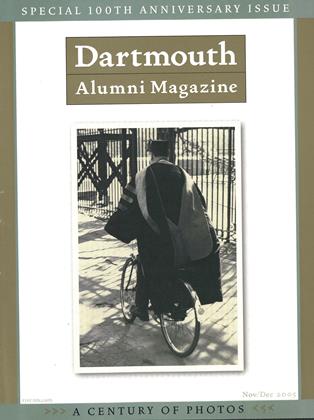TRAGEDY TOUCHED CAMPUS TWICE this summer through two student deaths: the murder in Berkeley, California, of Meleia Willis-Starbuck '07, and the Connecticut River drowning of Trinity College undergraduate Valentin Valkov the night before his graduation from the Tuck School's summer Business Bridge Program. In response campus administrators and support staff implemented a coordinated plan to assist affected students.
"College kids don't always think about their mortality, and when something like this happens, it's a jolt," says dean of upper-class students Sylvia Langford, who along with Tucker dean Stuart Lord and assistant dean Dawn Hemphill, advisor to black students, accompanied 16 of Willis-Starbucks friends to a memorial service in Berkeley. Dartmouth scheduled two services of its own: a candlelight vigil in July and a formal memorial on her October 10 birthday. "Student deaths really rock our entire campus, and, unfortunately, we have more practice at this than we'd like," says Langford.
Indeed, the College follows a scripted protocol after a crisis, with each office assigned specific responsibilities. The president's office rapidly pulls together a meeting of pivotal players who continue to meet—sometimes twice a day—during the aftermath. Representatives from medical services, mental health counseling, the deans' office, Tucker Foundation, Safety & Security, public affairs and legal counsel all convene to answer key questions: Who needs support most immediately? How many members of the community will be affected? How can teams be sent to different areas? Complicating matters, says Dr. Mark Reed, head of counseling services, is Dartmouth students' predilection for activity in several different communities that may or may not overlap. He and his staff of eight provide individual and group therapy to all affected, free of charge and unrestricted by time limits. Leaders of the deceaseds religious community, if any, cooperate with the college chaplain to provide spiritual support.
In July counselors reached out to Bridge students, who learned of Valkovs death the morning of their graduation. Tuck administrators allowed students the option to stay on campus and share their grief with others while Dicks House helped connect those departing with support services in their home communities.
In addition to emotional support, Dartmouth also provides academic counsel to struggling undergraduates. Lisa Thum, dean of the class of 2007, oversaw plans following Willis-Starbucks death and focused on alerting students to available resources and discussing academic options ranging from extended deadlines, election of an "incomplete" to finish coursework after semester s end, and late drops of classes or even an entire term. "There were quite a few incompletes this summer," admits Thum, who communicated with professors on behalf of students—but not because students tried to take advantage. "What I see more of is the student who feels guilty asking for a break due to a death. You sometimes have to talk a student into taking an incomplete; at Dartmouth, with a 10-week term, losing a week or two of productivity can be devastating."
 View Full Issue
View Full Issue
More From This Issue
-
 Feature
FeatureForged by Flame
November | December 2005 By LEE MICHAELIDES -
 Cover Story
Cover StoryA Century of Photos
November | December 2005 -
 Feature
FeatureNotebook
November | December 2005 -
 Feature
FeatureAlumni News
November | December 2005 By Heather Brubaker '97, Heather Brubaker '97 -
 OUTSIDE
OUTSIDEDog Day Afternoons
November | December 2005 By LISA DENSMORE ’83 -
 PERSONAL HISTORY
PERSONAL HISTORYPaying the Price
November | December 2005 By JEFF DUDYCHA ’93
Lauren Zeranski '02
-
 Article
ArticleFamily Affairs
Sept/Oct 2004 By Lauren Zeranski '02 -
 Article
ArticleOn the Lookout
Jan/Feb 2005 By Lauren Zeranski '02 -
 Profile
ProfilePROFILE: Hany Farid
July/August 2005 By Lauren Zeranski '02 -
 Profile
ProfilePROFILE
Mar/Apr 2007 By Lauren Zeranski '02 -
 Profile
ProfilePROFILE
Mar/Apr 2008 By Lauren Zeranski '02 -
 Profile
ProfilePROFILE
Mar/Apr 2009 By Lauren Zeranski '02








